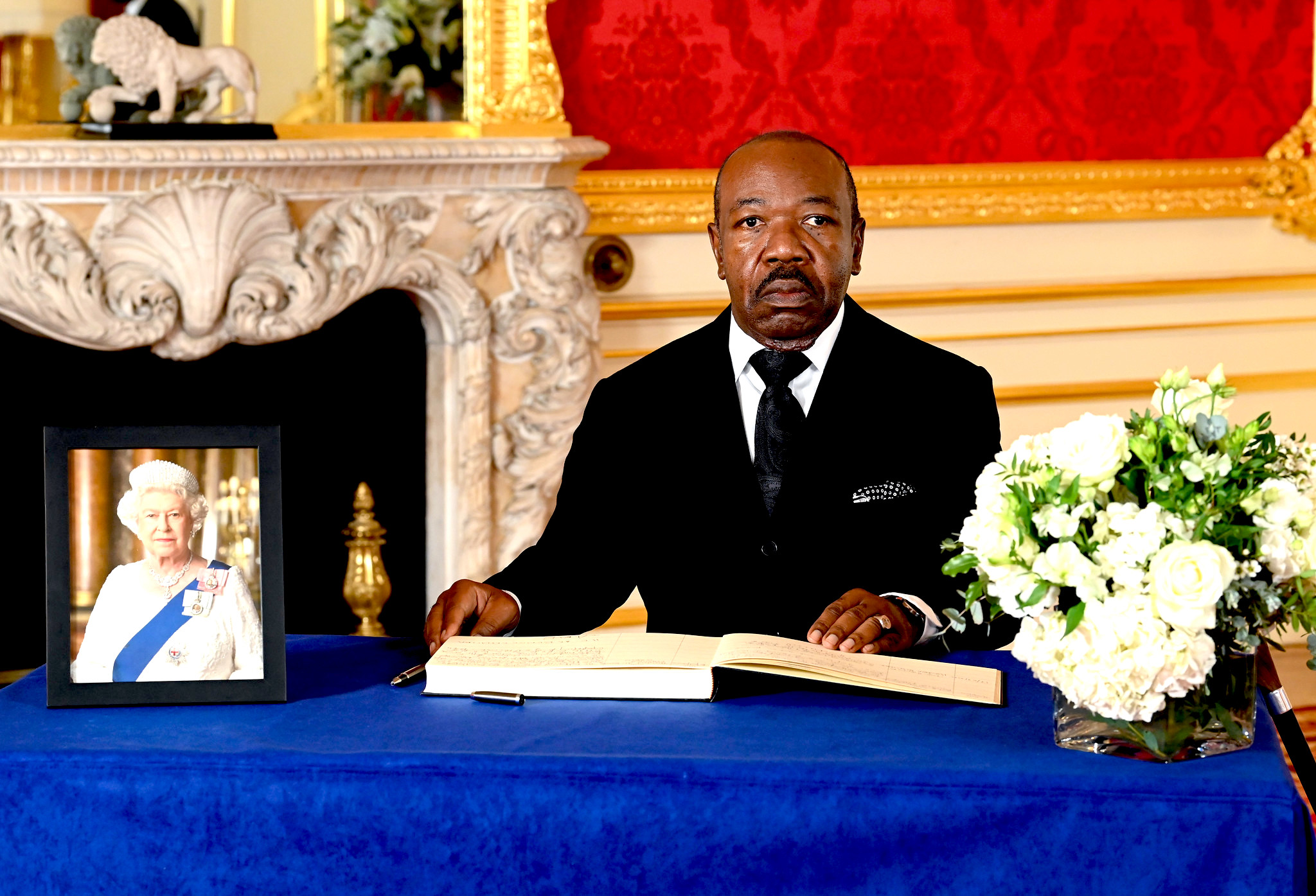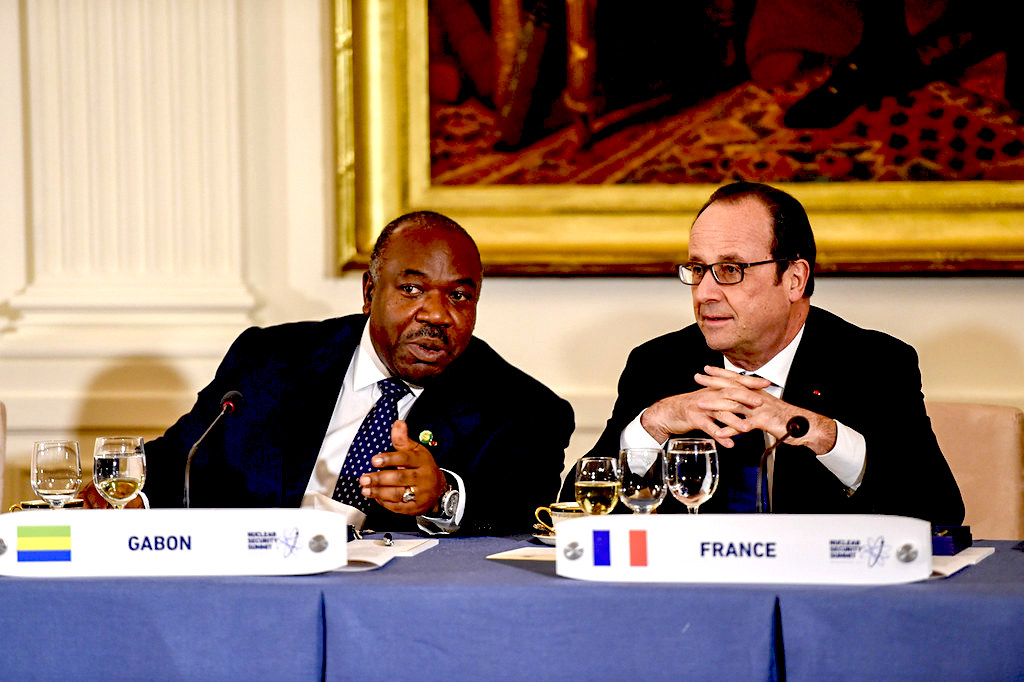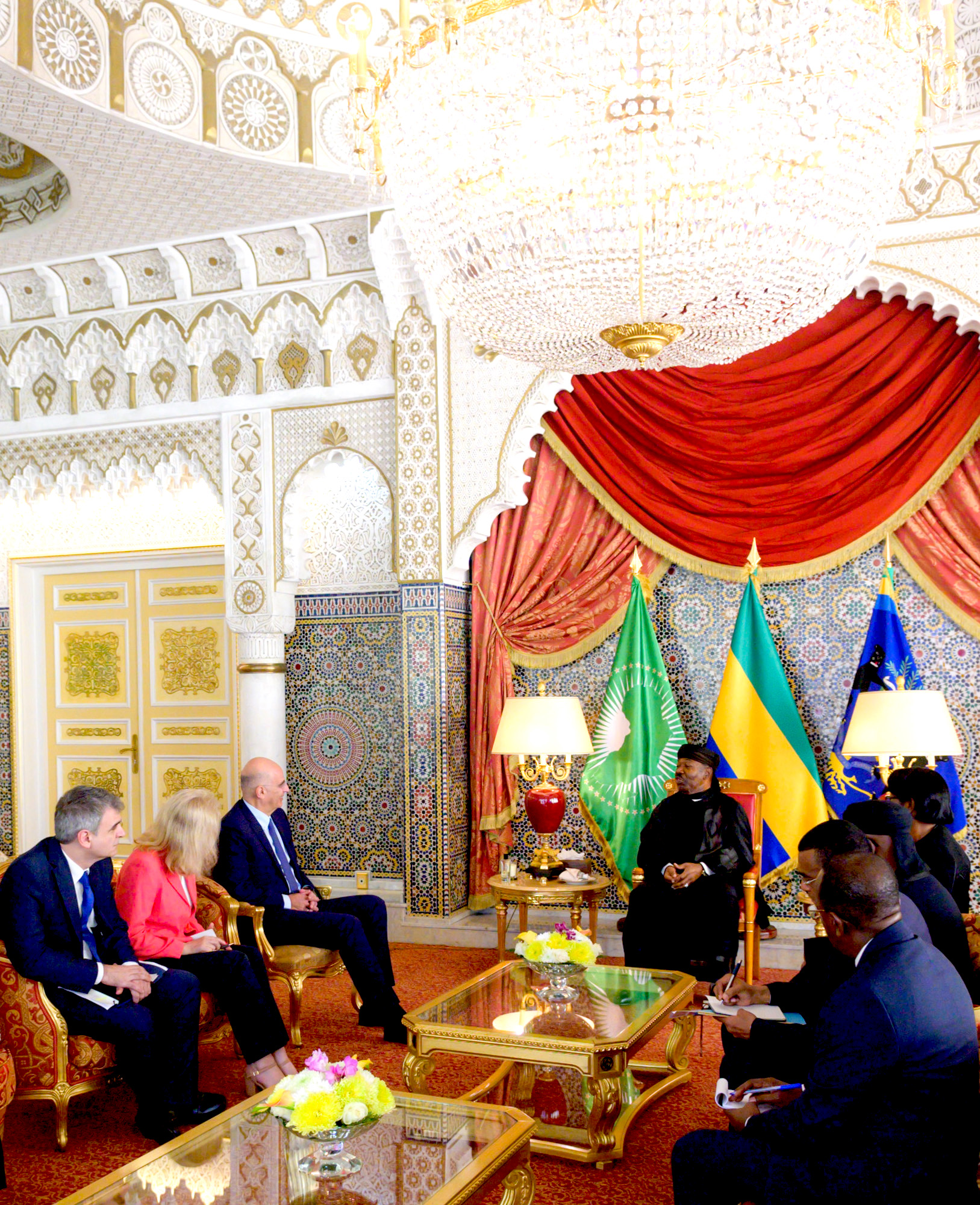Elections in the country during the dynasty’s decades in power were followed by protests, then security force crackdowns and ultimately silence, writes Douglas Yates. Until Wednesday, when the Bongo regime was finally overthrown.

Sept. 18, 2022: Gabon’s President Ali Bongo Ondimba signs a book of condolence in London, following the death of Queen Elizabeth II. (Jonathan Hordle/PA Media Assignments, Foreign & Commonwealth Office, Flickr, CC BY 2.0)
By Douglas Yates
American Graduate School in Paris (AGS)
 A military intervention appears set to end the Bongo family’s 56 years hold to power in Gabon. A group of senior military officers announced on Wednesday that they had seized power shortly after President Ali Bongo Ondimba was declared winner of the country’s recently held presidential poll.
A military intervention appears set to end the Bongo family’s 56 years hold to power in Gabon. A group of senior military officers announced on Wednesday that they had seized power shortly after President Ali Bongo Ondimba was declared winner of the country’s recently held presidential poll.
The coup leaders claimed the Aug. 26 general election was not credible. They announced a cancellation of the election result, closure of all borders and dissolution of all state institutions including the legislative arm of government.
[Related: Another Regime in ‘French West Africa’ Is Toppled]
Ali Bongo was said to have won 64.27 percent of votes cast in the election that the opposition described as a sham. According to the electoral umpire, Bongo’s main challenger, Albert Ondo Ossa, came second with 30.77 percent.
Ali Bongo, (son of former president Omar Bongo who ruled the country from 1967 to 2009) contested the election on the platform of the ruling Parti Démocratique Gabonais (PDG), founded by his father. The party has monopolised power in the oil-rich central African country for more than half a century.
The Bongo family held onto power for 56 years. It did so through single-party government, corruption in the mining and oil sectors, and political kinship. According to some estimates Ali Bongo personally controls $1 billion in assets, much of that secreted overseas, making him the richest man in Gabon.
In addition, the constitution has been changed several times in the past decades to ensure the Bongos’ continued rule.
First, term limits were removed from the constitution in 2003, ensuring that Bongo could serve as president for life.
Second, traditional two-round ballots were changed into single-round ballots, also in 2003. This was to ensure that Bongo’s opponents could not rally around a single challenger in a run-off.
Third, instead of requiring that the winner obtain a majority, all that is needed for Bongo to be re-elected is a plurality. This means a majority could be less than 50 percent, as long as the winner has the most votes. Had he been required to win a majority of votes, Ali Bongo, with 49.8 percent in the 2016 election, would not have won.

March 31, 2016: Ali Bongo chats with French President François Hollande at the Nuclear Security Summit dinner held at the White House in Washington, D.C. (GPA Photo Archive, Public domain)
Fourth, in April, the presidential term was reduced from seven to five years, ensuring the presidential elections would occur at the same time as legislative and local elections.
In the past, after presidential elections, opposition parties would organise against Bongo’s ruling party to capture seats in the legislative and local elections. The change made it much more likely that all the institutions of government power would have been taken by Bongo and his party in one single election.
Bongo’s party increased its seats in the National Assembly, holding 63 out of 120 seats in 1990 and most recently 98 out of 143 in 2018. The ruling party has also increased its share of seats in the Senate from 52 out of 92 in 1997, to 46 out of 67 in 2021.
The continuous rule by the Bongos was not good for a country of just 2.3 million people. Gabon is a resource-rich country and was once heralded as the “Kuwait of Africa.” Because of its small population and large oil reserves, per capita income is at least $13,949.16. In neighbouring Cameroon, per capita income is only $3,733.
But Gabon’s “average” is belied by a population where a third of the citizens live below the poverty line and unemployment stands at about 37 percent among young people.
Dynastic Republic

Aug. 26, 1988: Omar Bongo thanks participants in Gabon Medflag 88, in which American military personnel provide medical assistance and training to citizens of his West African nation. (U.S. National Archives)
Gabon is not a monarchy but a “dynastic republic.”
In dynastic republics, presidents have concentrated power in their hands and established systems of personal rule. They transmit state power through nepotism to their family and kin. This includes sons and daughters, wives and ex-wives, brothers and sisters, half-siblings and step-siblings, cousins, uncles and aunts, nieces and nephews, in-laws, illegitimate children and so on.
Under this system, the classical ideal of a legal-rational state — where position and rank are distributed based on merit in the name of the rational (efficient and effective) functioning of government — is corrupted.

Ali Bongo receiving Greek officials in January. (Greek Ministry of Foreign Affairs, Wikimedia Commons, CC BY-SA 2.0)
In all dynastic republics around the world — including Togo, Equatorial Guinea, Syria, Azerbaijan, North Korea, Turkmenistan and most recently Cambodia — an institutionalisation of traditional family power through the modern vehicle of a single ruling party has been critical.
In Gabon, this is the Parti Démocratique Gabonais. The party held the Presidential Palace and has a majority in the National Assembly (98/143 seats) and in the Senate (46/67 seats). It also controls the courts, and the regional and municipal governments.
It is critical to understand that no man rules alone. Only with a large party apparatus can a man and his family rule a republic with millions of people.
But why was the rule by one man and his family tolerated?
The answer is the political elite needed him to keep their own positions.
The economist Gordon Tullock hypothesised back in 1987 that dynastic succession appeals to non-familial elites who are wary of a leadership struggle. In 2007, professor of government Jason Brownlee tested this theory by looking at 258 non-monarchical autocrats. He found that
“in the absence of prior experience selecting a ruler through a party, regime elites accepted filial heirs apparent when the incumbent had arisen from a party and his successor predominantly emerged from that organisation.”
Political scientists Bruno Bueno de Mesquita and Alastair Smith argue that
“essential supporters have a much greater chance of retaining their privileged position when power passes within a family from father to son, from king to prince, than when power passes to an outsider.”
Omar Bongo founded the PDG in 1967 as a de jure one-party system. After constitutional reforms in 1990, he permitted the existence of opposition parties. But because he never held free or fair elections, the democratic opposition has never managed to wrest power from either the Bongos or their ruling party.
In the past, elections in Gabon were followed by protests, which were followed by security force crackdowns and ultimately silence. But the 2023 election may turn out to be different as it appears to have been followed by a military coup.
This article was updated on Aug. 30 to reflect the coup in Gabon.![]()
Douglas Yates is professor of political science at American Graduate School in Paris (AGS).
This article is republished from The Conversation under a Creative Commons license. Read the original article.
The views expressed are solely those of the author and may or may not reflect those of Consortium News.

Africa needs to oust all western influencers or they will never be truly free! I think the US government is trying to do to us what the western imperialists have done to all third world countries in the world for generations – make those who are crony murderers wealthy and the rest of us their servants/slaves…Time to wake up comatose America before you have the boot heal of the real enemy on your necks…
This is an example how democracy can be a dictatorship; how can a family be in power for more than 50 years and still call it democracy? this is not about how many people vote a person to represent them because they don’t have other choices, or because they are misled, forced to vote for that person, democracy should also be about giving chances to different people, ethnicity, social background. Although, for me, true democracy is more similar to anarchy, but the latter to be a functional system will require investing much substantially into educating people in various disciplines, in sharing wealth and power.
In Africa it appears that some sort of “African spring” and “black color revolution” is taking place; dynamism is humanity, we can’t expect that borders and socio-political system are fixed forever, that they keep the status quo. You keep them from changing and they will deteriorate and ultimately die.
One day, when humanity has grown up, all our constitutions we will allow secession, perhaps under certain conditions, but it won’t be repressed it and considered illegal.
It is Utopia thinking that what we have is immutable, it is against every laws of nature
Well said, Guillermo.
30 years ago a Dutch oilman told me that Western corporations were polluting the fragile water table with toxic chemicals to extract as cheaply as possible.
The companies handed out bottle water to elites but nothing for the people who were drinking water likely to inflict cancer and disease.
He was disgusted by the corruption, poverty and squalor under which the people struggled to survive.
All that wealth so unevenly distributed overseen by French and Western companies.
The article was not clear on this point, but the military must have deemed the election “not credible” when the masses are standing outside the palace with torches and machetes. As with the Biden fiasco, Trump routinely draws thousands while Biden can’t even fill a high school gym.
France Out of Africa: U.S. and NATO Too!
Well, the last election in Gabon was certainly as credible as the next United States election is likely to be. Looks like US and French intelligence agencies are dropping the ball in Africa, too busy manipulating internal elections at home. Dynastic presidencies, hmmm, that appeals to elitist US familes like the Bush, Clinton, Obama and Biden families.
Amen! Smells like rats from the CIA are at work.
Wrong, Bill.
usa elections are vastly more credible.
Gabon, similar to the uk, has been a monarchy.
usa is dynastic in its own manner — unwanted usurpers don’t get to play.
Yates attempting to give credence to expotus45’s election protests.